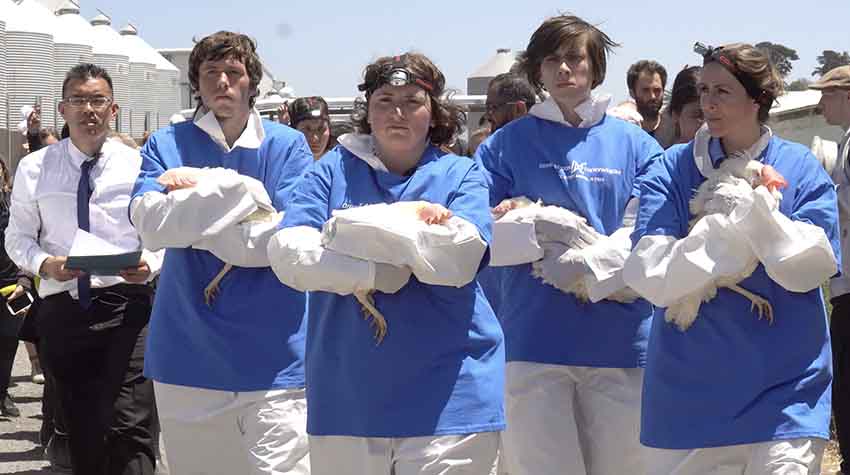
August 31, 2023Faculty, Media ReleaseHarvard Law Professor Submits Brief Declaring Necessity Defense Applies to the Rescue of Animals
Professor and Faculty Director of the Brooks McCormick Jr. Animal Law & Policy Program at Harvard Law School submits a brief in support of defendants charged with felonies for rescuing animals at California egg producer.
AUGUST 31, CAMBRIDGE, MA – On Wednesday, Harvard’s Brooks McCormick Jr. Animal Law & Policy Program Faculty Director and Law Professor Kristen Stilt submitted an amicus brief in a California criminal case asserting that animals are “someone” under the law of the necessity defense. The brief also argues that ordinary citizens therefore have the right to raise the necessity defense when they are charged in connection with animal rescue, even when the rescue is from corporate factory farms.
The brief was put forth in a felony criminal case in Sonoma County, California, where three animal rights activists face years in prison for organizing a peaceful demonstration in May 2018 in which dozens of sick and injured animals were removed from a “humane certified” egg-supplier to Whole Foods. Despite holding a legal opinion from a distinguished legal scholar regarding the lawfulness of their actions, the activists have been charged with felony conspiracy and burglary and go to trial on September 8.
Professor Stilt’s brief argues that “The necessity defense, as set forth in CALCRIM Sec. 3403, should be interpreted to apply when an individual is acting to prevent significant bodily harm or evil to an animal, including an agricultural animal, because animals are sentient beings who can feel pain and suffer bodily harm.” Interpreting CALCRIM Sec. 3403 to apply only when an individual acts to aid a human would conflict with significant areas of California law and would be inconsistent with California’s clear expressions of public policy, Stilt explained in the brief.
An amicus curiae (Latin for “friend of the court”) is a brief filed by a non-party in a court case to assist the court by offering information, expertise, or insight that has a bearing on the issues in the case. Here, Professor Stilt is offering an expert opinion that the necessity defense, which protects citizens when they act to prevent “significant bodily harm” to “someone” who is facing an emergency, should apply in the case of animal rescue.
The brief cites legislation in California that aims to aid animals in distress, including the California Health and Safety Code, which provides civil immunity to any individual who provides first aid to a pet or any domesticated animal in an emergency. The brief also cites California Penal Code 597e, which deals with the situation in which an animal rescuer provides an animal who is confined on someone else’s property with necessary food and water. Penal Code 597e provides the rescuer “immunity for what would otherwise be a trespass.” The brief argues that California public policy makes clear that animals are sentient beings deserving of recognition and protection under the law.
Other Harvard professors have previously written about the commonality between humans and other animals, but this is the first time a Harvard law professor has filed a formal, legal argument declaring that animals are “someone” for purposes of the necessity defense.
Since 2009, more than 100 climate protesters in more than 30 criminal cases have argued the necessity defense to justify actions taken to protect the planet, and in recent years, they have had some key wins, including in the Minnesota Supreme Court. At that trial in October 2018, the judge acquitted environmental activists of multiple felonies. The Sonoma defendants argue that if the planet is entitled to protection under the necessity defense, then so too are living beings.
The DxE activists in California are planning to use the necessity defense in their trial starting on September 8. In the last year, DxE activists have won the first two acquittals for open rescue in history, in trials in St. George, Utah and Merced, California.
“This amicus brief will go down as one of the landmark moments when the history of this litigation is written. It provides rigorous legal support for the commonsense intuition of the average person. In fact, based on interviews with jurors from the prior trials, we know that these ordinary persons understood that a rescue was necessary and legal, even without a formal jury instruction on the necessity defense,” said civil rights attorney and law professor Justin Marceau. “It’s time the courts officially acknowledge what the law already makes clear, that animals are someone.”
-Ends-
Media Contact: Alison Morikawa Barnard – [email protected] – (916) 640-4777 or Sarah Pickering – [email protected] – (617) 582-4948.
